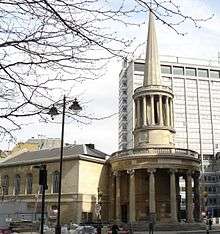Evangelical Anglicanism

Evangelical Anglicanism or evangelical Episcopalianism is a tradition or church party within Anglicanism that shares affinity with broader Evangelicalism. Evangelical Anglicans share with other evangelicals the attributes of "conversionism, activism, biblicism and crucicentrism" identified by historian David Bebbington as central to evangelical identity. The emergence of evangelical churchmanship can be traced back to the First Great Awakening in America and the Evangelical Revival in Britain in the 18th century. In the 20th century, prominent figures have included John Stott and J. I. Packer.[1]
In contrast to the high church party, evangelicals minimize the importance of liturgical forms in favor of an experiential religion of the heart. As a result, evangelicals are often described as being low church, but these terms are not always interchangeable because low church can also describe individuals or groups that are not evangelical.[2] Likewise, distinctions can also be drawn between evangelical churchmanship and Anglicans involved in the Charismatic Movement. While charismatic Anglicans are theologically conservative and evangelistic, they do not necessarily identify with classical evangelical churchmanship.[3]
Description
In contrast to Anglo-Catholics, evangelicals stress the Reformed, Protestant nature of Anglicanism. Evangelicals have been particularly fierce critics of teachings and practices they consider to be ritualism or sacerdotalism, such as baptismal regeneration or the real presence of Christ in the Eucharist.[4] Historically, evangelicals have come from both moderate Calvinist as well as Arminian backgrounds.[5][6] Evangelicals stress the need for a conversion experience and the importance of evangelism; they have a high view of biblical inspiration and biblical authority; and the substitutionary atonement of Jesus Christ is the focus of their preaching.[3]
History
Evangelicalism emerged out of the religious revivals of the 18th century.[1] While previous movements in the Church of England had revolved around issues of church order and authority, evangelicals stressed lifestyle, doctrine and conduct. Evangelicals emphasized domestic religion, especially family prayer. Evangelical concern for the moral reform of society manifested itself in large scale support for missions, schools, charitable societies for the poor, and the formation of the Society for the Suppression of Vice. It was also demonstrated by political campaigns in the British Parliament, the most important being the movement to abolish slavery led by William Wilberforce. Wilberforce was a prominent figure in a network of evangelical social reformers nicknamed the Clapham Sect.[7]
Evangelical insistence on the necessity of conversion provoked controversy within the Church of England over the doctrine of baptismal regeneration. Evangelicals rejected this doctrine, a position summarized by Charles Sumner, Bishop of Winchester, who wrote, "I must look, notwithstanding his baptism, for the Scriptural evidence of his being a child of God." The controversy came to a head in the late 1840s in what became known as the Gorham Judgment. In 1847, Henry Phillpotts, Bishop of Exeter, refused to induct George Cornelius Gorham as vicar of a parish in Devon on the grounds that Gorham did not believe in baptismal regeneration. Gorham appealed the case all the way to the Privy Council, which in 1850 ruled in Gorham's favor.[8]
Charles Simeon was the most influential leader of evangelical Anglicanism. He established the Simeon Trust, a fund that became a major source of evangelical patronage. By the time of his death, the Trust controlled the livings of 42 churches, including Bath Abbey. He also helped to found the Church Missionary Society in 1799, which was meant to be an evangelical alternative to the high church Society for the Propagation of the Gospel in Foreign Parts. The society sponsored mission work in India, Africa, and Australia. In 1804, the British and Foreign Bible Society was founded to provide Bibles in different languages to accompany the missionary work.[9]
References
Citations
- 1 2 Harp 2005, pp. 180–181.
- ↑ Harp 2005, p. 180.
- 1 2 Harp 2005, p. 181.
- ↑ Chapman 2006, p. 68.
- ↑ Cundy & Howdle 2008, pp. 119–121.
- ↑ Harp 2005, p. 182.
- ↑ Chapman 2006, pp. 60–61.
- ↑ Chapman 2006, p. 63.
- ↑ Chapman 2006, pp. 64–65.
Bibliography
- Chapman, Mark (2006). Anglicanism: A Very Short Introduction. Very Short Introductions. Oxford University Press. ISBN 9780192806932.
- Cundy, Ian; Howdle, Peter, eds. (2008). Embracing the Covenant (PDF). Methodist Publishing House.
- Harp, Gillis J. (June 2005). "The Strange Death of Evangelical Episcopalianism". Anglican and Episcopal History. Historical Society of the Episcopal Church. 74 (2): 180–206. JSTOR 42612883.